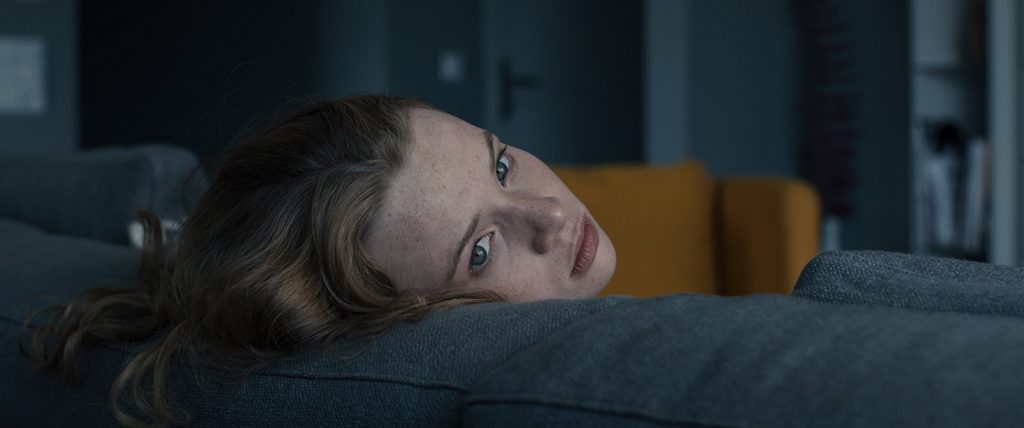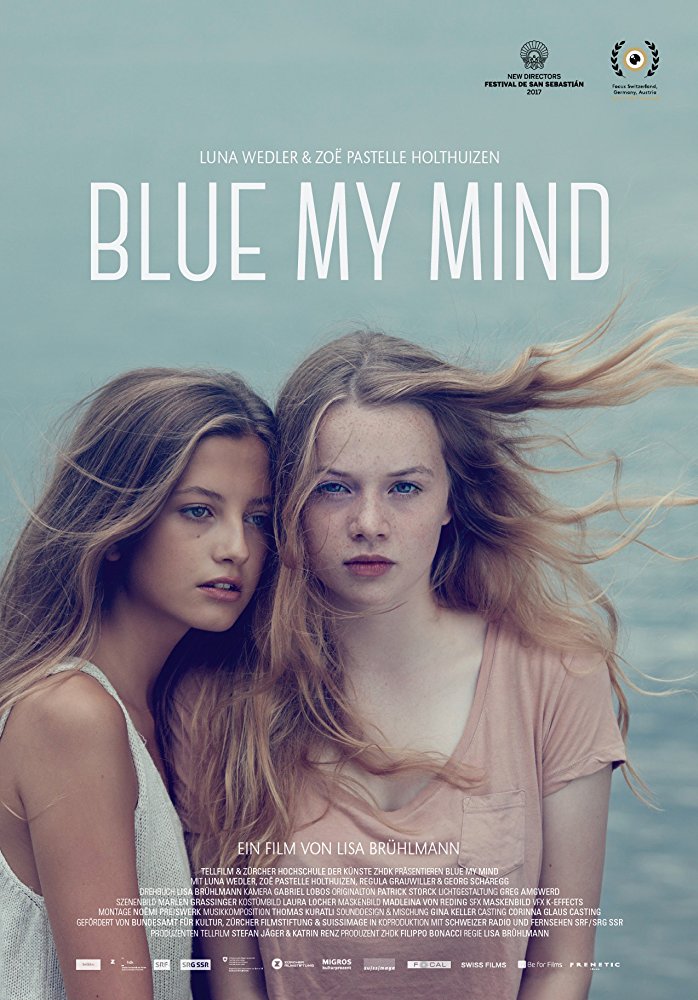 It’s been pleasing to see an apparent rise in films about girls and the aftermath of adolescence in the horror genre of late, with 2016’s Raw perhaps being the stand-out example. Blue My Mind is the latest, and it’s a striking and engaging film. The young woman at the centre of the film is Mia (Luna Wedler), who has just moved to a new town. Immediately attracted to the bad kids in her class, namely Gianna (Zoë Pastelle Holthuizen), Nelly (Lou Haltinner) and Vivi (Yael Meier), Mia struggles to fit in. They reject her at first, but soon the girls are Mia’s only source of happiness in the new town, particularly as she feels increasingly alienated from her parents. When her body starts to show signs of change – webbed toes and strange bruises – Mia becomes increasingly reliant on the normality offered by her wayward friends while she struggles to understand what’s happening to her.
It’s been pleasing to see an apparent rise in films about girls and the aftermath of adolescence in the horror genre of late, with 2016’s Raw perhaps being the stand-out example. Blue My Mind is the latest, and it’s a striking and engaging film. The young woman at the centre of the film is Mia (Luna Wedler), who has just moved to a new town. Immediately attracted to the bad kids in her class, namely Gianna (Zoë Pastelle Holthuizen), Nelly (Lou Haltinner) and Vivi (Yael Meier), Mia struggles to fit in. They reject her at first, but soon the girls are Mia’s only source of happiness in the new town, particularly as she feels increasingly alienated from her parents. When her body starts to show signs of change – webbed toes and strange bruises – Mia becomes increasingly reliant on the normality offered by her wayward friends while she struggles to understand what’s happening to her.
A few years back I had the pleasure of seeing Der Nachtmahr at Imagine Film Festival, a film that still, for some reason, doesn’t seem to have been released in the UK. From seeing the trailer to Blue My Mind, I was immediately reminded of Der Nachtmahr, and the comparison is, I think, an apt one, though they might be flipsides of each other. Telling similar stories of distressed young women, where Der Nachtmahr is often loud, brash and aggressive in its style, Blue My Mind is the softer flipside, the hazy Spring Breakers-esque style being the dominant form.
That’s not to say that Blue My Mind is remotely a soft film, though – far from it. Its slow pace will be a challenge, and I did wonder early on whether my attention might drift or if the film might not reward my patience. The film proved me very wrong, in that regard. The narrative builds in a very subtle and ultimately very satisfying way, and the deliberate pace is an important part of that. The film is not without moments of action or loudness – it’s often about girls behaving badly, after all – but those moments never break with the overall tone of the film. Quite how a film succeeds in being both leisurely and urgent is beyond my interpretive skills, but that’s how it feels watching it, particularly in its final 20 minutes or so.
Blue My Mind is also a visual and aural treat – water and the colour blue are both recurring elements of that, as you might expect. There’s also a really refreshing depiction of female bodies – even though they are self-sexualised by these teen characters, there’s never a feeling of exploitation in how they’re depicted on screen. They wear skimpy clothes and copy sexy dance moves, but the way the film presents them to us is notably non-sexualised, and, further still, non-judgemental.
 The film appears to do a great job of depicting modern teenagers, because at several instances I felt myself thinking, ‘young people are weird’. They skip school, shoplift, do drugs, drink, have sex with strangers, party and at one point partake in a breath play dare. Do real teenagers do all of these things, seemingly all the time? Who knows, but the film is about the outcast naughty kids in class, and what it does brilliantly is make them sympathetic: they’re bitchy and aggressive with each other, but they resolutely look after each other. The central bond between Mia and Gianna is built up so carefully and so well that by the film’s climax you can’t but believe that they would really do anything for each other.
The film appears to do a great job of depicting modern teenagers, because at several instances I felt myself thinking, ‘young people are weird’. They skip school, shoplift, do drugs, drink, have sex with strangers, party and at one point partake in a breath play dare. Do real teenagers do all of these things, seemingly all the time? Who knows, but the film is about the outcast naughty kids in class, and what it does brilliantly is make them sympathetic: they’re bitchy and aggressive with each other, but they resolutely look after each other. The central bond between Mia and Gianna is built up so carefully and so well that by the film’s climax you can’t but believe that they would really do anything for each other.
It might be the female friendships that really make Blue My Mind stand out, but it also features a glorious display of body horror, as Mia experiences the inexplicable contortion and change of her body. This change manifests in her behaviour, too – she keeps compulsively eating the family goldfish – but primarily in the slow change of her legs through mottled bruising that spreads and skin that peels away. The trailer for the film shows us a bit too much, and from that I had my concerns that the film would lose its impact as a result, but not so. When Mia takes her final form it is elegant, believable, and just the right amount of grotesque.
Quite specifically what Mia’s experience is a representation of is open to interpretation, but whatever the interpretation, it’s a very well-presented metaphor for deteriorating mental health. At the same time, it’s also archly mythological, and needn’t be read as metaphor at all. Blue My Mind offers a complex and rewarding experience, making for essential viewing.
Blue My Mind will be showing as part of the East End Film Festival this April. For further information about this festival, please click here.
